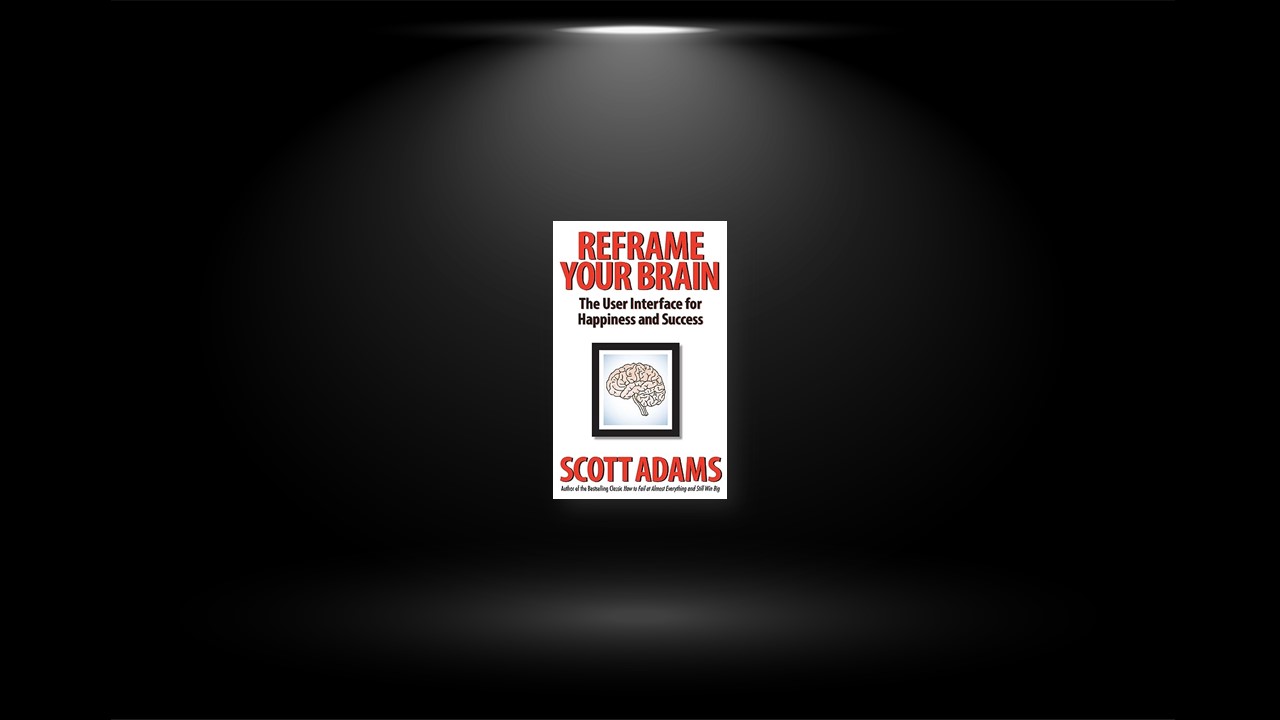What does it take to rewire a brain? Not much. You only need three things, and one of them is optional:
- Focus
- Repetition
- Emotion (fear, happiness, hate, love, passion, etc.)
You can rewire brains fastest with an emotional turbocharge, but focusing on and repeating a reframe without emotion will also get you where you want to go eventually. Your brain builds new structures in response to whatever stimuli you’re pumping into it.
Focus and repetition move an idea (or reframe) from conceptual to physical, meaning physical changes in your brain structure. Adding emotion can make the rewiring happen faster, but again, that part is optional. If you want to add emotion to a reframe to give it more impact, you can start with a reframe that is conceptual, such as this familiar saying: What doesn’t kill you makes you stronger.
To add emotion to the reframe, think about what accomplishment this new strength will help you achieve. Do you need to gather strength to demand a raise or to win a competition? Focus on an emotionally powerful endpoint and imagine it often. That emotional energy will make the reframe burrow into your mind faster.
Usual Frame: Manage your time.
Reframe: Manage your energy.
You can produce more in fifteen minutes with the right energy than four hours with the wrong energy. Most creative people will tell you something similar. There is a time of day that works best for creative work and other times that do not work at all. The same holds for exercise.
The secret to managing energy as opposed to time is to gain as much control as you can over your own schedule. If you have a boss, you might not have options about when you do what. If you have a spouse or family or pet or other obligation, those, too, can force you out of the more productive and happy energy management mode into time management mode.
When you manage energy instead of time, you might not get around to all the tasks that need to get done. The solution to that: Don’t do those tasks. At least not today. If that sounds irresponsible, think of all the things that ever went wrong because you didn’t get something done that was in the bottom 20 percent of your priorities.
Usual Frame: Your job is what your boss tells you it is.
Reframe: Your job is to get a better job.
Don’t confuse your job with the work your employer wants you to do. The boss might want you to process all the pending orders by quitting time, but your job is to get a better job. Everything else you do should service that reframe. If it doesn’t help you leave the job you are in and upgrade, it might not be worth doing. But don’t worry that this line of thinking feels sociopathic—doing a good job on your assigned duties is one way to look good for promotions.
The reframe reminds us to be in continuous job-search mode, including on the first day of work at a new job. If that sounds unethical, consider that your employer would drop you in a second if the business required it.
Usual Frame: Embarrassment is something to be avoided.
Reframe: Embarrassment is an investment.
In the short run, embarrassment can sting. In the long run, you will be tougher for the experience, and you might have a funny story to tell. You almost always come out ahead when you take a hard shot to your ego and survive to play again. And some of those potential embarrassments turn into life-changing victories that couldn’t have happened without putting yourself out there. So the next time you see an opportunity to embarrass yourself, repeat “cha-ching” (the cash register sound) in your mind instead of “oh-no.”
Learning to laugh at your own embarrassments is one of the most useful skills a person can develop. It can help you financially, socially, and mentally, as the next reframe explains, by helping you better understand reality and deal with it more successfully.
Usual Frame: The effort is so big and daunting I can’t even start.
Reframe: What’s the smallest thing I can do that moves me in the right direction?
Momentum can often create more momentum, especially if you find “fuel” along the way, like the way some video games work; you can only complete your mission if you find energy sources as you go.
Treat the real world as if it’s that kind of video game—by starting journeys without knowing how to get the fuel to complete them. Have faith that good projects become somewhat self-fueling, so after an initial nudge, they will start dragging along for the ride. Instead of draining energy, they become suppliers.
Usual Frame: Success requires setting goals.
Reframe: Systems are better than goals.
A system is something you do every day to create good options for yourself in the future. Some people conflate systems with “practice,” which is also a type of system, but not the whole story. The best systems give you many options. Ordinary “practice” might be preparing you for exactly one thing, which may be the right thing to do (or not). So practice alone is not nearly as useful as a system that prepares you for multiple opportunities. Being flexible and prepared for anything is a good position to be in if you live in a rapidly evolving world.
Getting a college education is a system because it gives you multiple career options. You might have a general sense of where your career will go, but you are (usually) not over-specifying it. And that’s good because your preferences and your opportunities change all the time. It’s safest to develop skills that can fit a variety of situations.
Learning to be a plumber might be a great career path, but it isn’t an ideal system because it limits you to that one profession. Systems increase options; they never limit them.
Usual Frame: Focus on being excellent at a skill that has commercial value.
Reframe: Acquire skills that work well together and make you rare and flexible at the same time.
The simplest example of building a talent stack is adding public speaking skills to any big-company job. That one skill set makes you the obvious choice for promotion to manager. It also makes you a better candidate for a variety of lateral and upward career moves.
If you also add effective listening skills, business writing, contract negotiation, and some people skills, not much can stop you. And you could learn that entire stack of skills in a month without breaking a sweat. You should start with your natural talents and interests and figure out what else plays well with them. Here are some examples:
If you like finance, learn to be a good communicator and your options multiply. If you speak a second language, start a business (or work for one) that puts your linguistic advantage to use. If you have a real estate license, learn to manage rental properties. Those work well together.
Usual Frame: Another problem! Why me???
Reframe: Ooh, a new puzzle to solve.
Humans are good at solving problems. Otherwise, we wouldn’t be here. Some of us are better than others, but we all seem to get through the challenges of the day. Today is unlikely to be different. Tell yourself your burdens are puzzles to solve—see if that changes how you feel.
Scott also recommends gamifying your repetitive tasks such as folding laundry, straightening up the house, or making the bed. You do this by treating the “skill” involved as a serious endeavor. For example, Scott can fold a bath towel so quickly and capably he feels like a circus performer. Every folded towel gives him a little dopamine release. A good fold literally feels good. By the time, he folded six towels, he is delighted with hand-eye-coordination. Strange but true.
Usual Frame: Do what you are told.
Reframe: Do what you are NOT told but maybe someone should have.
When you take initiative in front of others, they will trust you are the kind of person who takes care of business when no one is watching. Everyone wants to hire that person. Doing what you are told gets you a paycheck. Doing what you are NOT told (but is useful) gets you promoted. It also prepares you to be an entrepreneur if you want that in your future.
Usual Frame: Measure twice, cut once.
Reframe: Just start. See if you can figure it out as you go.
Doing your research before acting will always make sense. But like most good things, there can be too much of it. If your caution and research prevent you from acting and the consequences of tiptoeing into a project are not dramatic, you might be better off jumping in to see if you can sink or swim.
Usual Frame: You feel like a fraud. Everyone else is competent.
Reframe: You are learning fast. Look at all you learned!
Everyone is faking it (at least some of the time). Experts of all kinds: scientists, CEOs, entrepreneurs, billionaires, doctors, lawyers, you name it, have human biases and knowledge gaps. If you don’t believe, go to any expert with a problem that isn’t like the normal ones. You’ll lose all faith in humanity, but at least you won’t feel you are the only “impostor” in the game. Everyone in a new job is an impostor, and every experienced person encountering a novel situation is an impostor, too. You are in good company.
Make Your Own Reframes
By now, you have experienced the power of some of the reframes in this book. You probably felt some of them as soon as you read them while dismissing others as not applicable to you. And that’s okay.
This is a good time to remind you that some reframes will feel right to you and others won’t work with your unique brain and personality. The only caution here is that you might not be good at knowing which ones will work for you because reframes are often non-intuitive—and sometimes goofy—by design.
The good news though if you are reading this, you are probably already an improved version of the person who started reading. Your software has been updated. You are reborn, bristling with skills and freed from your past.
The final reframe is you.


